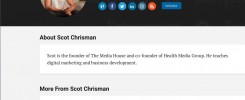What is Permission Based Pixeling?
Permission-Based Pixeling is an extension of permission marketing, in which you ask the user for permission to gather, track and use their data for marketing.
Data and information tracking/banking are some of the biggest elephants in the room right now, when it comes to the digital landscape.
Opinions range from the ethical marketing perspective of, “For the first time I can actually track real metrics and address the people whose problems I can actually solve.”
To the abused user who might say something like, “I don’t feel safe searching for anything that could be deemed ‘not normal’ because I might be caught in a compromising social situation…” Or, “I can’t be me without it being “public” and it’s not even my choice.”
As a marketer, I can see both sides of the argument…
The “new-ish” cookie policy tries to help that but I’m thinking it’s about time for a revolution in marketing. We realized a long time ago when Seth Godin introduced the idea of permission-based marketing that the power of permission far outweighs the power of force.
So why do we continue to walk down a road where we insist on the force?
I get that it works. Blast in the door with an exciting and enticing “mind enveloping advertisement,” get them to click and see your page when they decide not to buy… BLAST them with retargeting ads and eventually, they’ll buy, at least the ones that appreciated the reminder, right?
But what about the ones that didn’t want to be chased around by you pestering them about some flaw they have? What about the ones that visited a site out of curiosity and are now suffering from unwarranted suspicion because your retargeting ad found them at the wrong place and time?
So why don’t we, as marketers, take it one step further and just come out and say, “Do we have your permission to remind you about our products in the future via social media advertising?” Or, “Can we please help you remember us in the future when you’re on Facebook?”
What do you think that would do to your pixel data? What do you think that would do for your brand relationship equity for potential customers?
How might that change the war we’re fighting between information and anonymity?
Fortunately or unfortunately, tools will always create leverage and ultimately power. It’s what we do with those tools that determine their outcome. As a marketer, our impact is always going to be based on the true ethical value of the product or service we market, not the economic value we create.
Money is only as good as the problem it solves, and for the most part, the market will always correct for poor business practices and unethical behavior unless the market is controlled by unethical or immoral leaders.
So what does that mean in relation to pixels and the current digital marketing landscape? Well, value is relative(just like EVERYTHING else in this world), so this is why we allow markets to make decisions and as marketers, we dance with those movements. In order to create value for a user, we can give them unique autonomy over their path and their journey through the online walkthrough of our storefront.
And yes, I understand that it means getting to another yes. But as marketers, that’s what we do best. We find who wants to say yes, who’s been waiting to say yes as soon as they realized it was an option, but also to create a customer experience where they’re not just whispering, “yeah.”
One where they’re blown away by your candid nature, your authenticity, the value you’re providing and the personality you’re providing it with… One where they’re yelling, “YEAHHH! That was awesome!”
And no I’m not saying that permission-based pixeling is going to be the one thing that people are dancing with joy and howling at the moon about. But I do think it’s one more way we can go above and beyond to create relationships and parse data at the same time.
If your company truly solves problems in the world and you have a truly unique value in the market, your product could even soon be found in the hands of the “not-pixeled” because of a decision you allowed them to make and trust you earned along the way.
They’ll hear about your product again, especially if you adopt this early on. People will be shocked and although they may still think Zuckerberg is listening to them, they’ll still respect your decision to tell them that you could do and ask for permission instead.
Consent and autonomy will be the continuation of current marketing trends it’s the new sex appeal in all forms of advertising.
{ "@context":"http://schema.org", "@type": "BlogPosting", "image": "https://themediahouse.co/wp-content/uploads/2020/07/Permission-Based-Pixeling-.png", "url": "https://themediahouse.co/permission-based-pixeling/", "headline": "Permission Based Pixeling", "description": "Permission-Based Pixeling is an extension of permission marketing, in which you ask the user for permission to gather, track and use their data for marketing.", "datePublished": "2020-07-06", "dateModified": "2020-07-16", "inLanguage": "en-US", "isFamilyFriendly": "true", "copyrightYear": "2020", "copyrightHolder": "The Media House", "author": { "@type": "Person", "name": "Scot Chrisman" }, "publisher": { "@type": "Organization", "name": "The Media House", "url": "https://themediahouse.co/", "logo": { "@type": "ImageObject", "url": "https://themediahouse.co/wp-content/uploads/2018/04/logo_design_The_Media_House02-White.png" } }, "mainEntityOfPage": "True", "keywords": [ ], "genre":["SEO","JSON-LD"] }

